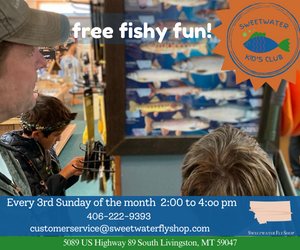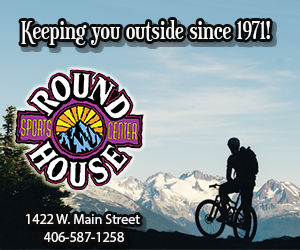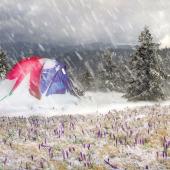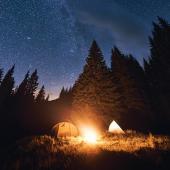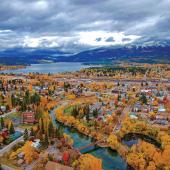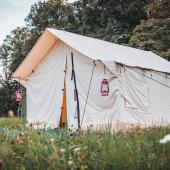Cycles
O how can it be that the ground does not sicken?
How can you be alive, you growths of spring?
How can you furnish health, you blood of herbs, roots, orchards, grain?
Are they not continually putting distemper’d corpses within you?
Is not every continent work’d over and over with sour dead?
—Walt Whitman
I’m not hungry, but I eat rice cooked in tomato soup because I think I should. It’s the first thing I’ve eaten today save a donut from the gas station in Bozeman. I felt nauseous when I left my house this morning, I felt nauseous when I reached the North Fork trailhead, and I feel nauseous now, sitting by my tent above Summit Lake. My head aches and every time I walk uphill my heart races. Earlier I had to dig a hole to throw up in, and then cover the warm vomit to keep animals away.
After I eat the tomato-rice, I let the dog lick the bowl. It’s gross, but I don’t feel like dealing with the cleanup. Rigby finishes, and as I stand to put the pot in the stuff sack, I grow light-headed and dizzy. My vision blurs. I squat, feel better and stand again, this time feeling okay.
Without warning, a fat droplet of water lands on my head. Then another hits my leg. Anxious to beat the deluge, I throw all the food into the stuff sack, sprint back and forth looking for a tree to hang the food from, realize there isn’t one, and, grabbing the dog and the food, dive into the tent. Just as I’m zipping the rainfly closed, the sky opens up and sheets of water roll down my tent. Laying prone on my sleeping bag, I listen to the wind scrape a branch across the nylon and I pet Rigby when thunder cracks the sky and makes him jump. Flashing lightning brightens the interior of my shelter.
Laying in the tent, feeling poorly, I wonder what would happen to me if I died here. I had come to the Spanish Peaks to explore these mountains, not to expire here. No one knows exactly where I am or specifically when I’ll be back. It could be a week or more before anyone realized I was gone. I unzip the screen a little so the dog can nudge his way out if I succumb; I don’t want him trapped in a tent with a corpse. I hope he follows some hikers out to the trailhead and they call the number on his collar. I feel better convincing myself that he’ll be all right.
The rain stops after 20 minutes, I don’t die, and I decide to go for a little walk. I head down to the lake and up the ridge on the other side. To the east the mountains shine in pinks and magentas—alpenglow—from the setting sun. I take a seat to watch the lightshow and consider again what would happen if I died here—not morbidly, just curiously, though maybe a little melodramatically.
If I do die, I hope no one finds me. If they did, I’d be carried out of the Spanish Peaks and into a coffin. I’d be pumped full of chemicals and then buried and left to pollute the soil. I’d rather be like a wild animal or a plant, which dies and continues to be part of the place it lived in.
While hiking along a trail in northern California with my college boyfriend nine years ago, I caught a whiff of death. Decomposing ungulates, like deer and elk, have a particular odor that I’d learned to distinguish from other dead creatures and I recognized it right away. Bryce, smelling it too, pointed to tufts of gray-brown fur scattered along the trail and into the bushes. A slight depression followed the fur.
We parted sword ferns as we followed the coarse hair and scent 15 feet off the trail to the edge of a meadow. There lay a bull elk, its glassy brown eye dully reflecting a redwood towering above it. The skin on its stomach was torn open and its insides were writhing and undulating. We looked closer, holding our noses. Maggots had filled the elk’s entire stomach cavity, decomposing and growing. Flies landed, deposited eggs, and departed from the elk’s head. When they descended on me I shivered and swatted. I did not want these opportunists of death and decomposition on my skin.
Bryce said he had heard about a mountain lion in the area, and this definitely looked like a lion kill. The elk had been dragged down the trail and into the meadow for private dining. We wondered if the lion was still near, if it was watching us, salivating until it could return to its elk. The stench grew unbearable, so we turned back towards the trail, flies circling our heads.
Decomposition follows death. It is part of the cycle. Nutrients pass through living creatures, the soil, the air, and back again. Decomposers facilitate this movement and when I die, I want this to happen to me.
All around me there are decomposers ready to take over after death. I glance around the rock looking for bacteria, fungi, and insects, anything that will break me down if I die here. But I know decomposers are too small or too hidden in the soil for me to see.
Without fungi, millipedes, bacteria, worms, larvae, and nematodes, carcasses would litter the Spanish Peaks. Black bears under willows, spiders on top of aspen; the bodies would reach the sky. Carbon, nitrogen, and phosphorous would be locked up in the carcasses, unable to cycle.
After watching the sun set on the mountains, I climb down the slope, the gneiss slippery after the rain, and walk around the lake. The air is still and crisp, feeling more like fall than spring. Several feet from the shore, grasses that grew green and verdant last summer are dry and brittle. Soon, they will break down and return their nutrients to the soil where something else can use them.
Strolling back to my campsite I hum a tune my dad used to sing, “The worms crawl in, the worms crawl out, the worms play pinochle on your snout. Up they jump and then they fall, while they’re eating your eyeball.” My dad, brother and I made up new verses, each more disgusting than the previous. I find myself hoping worms do crawl over me when I die. I even wish maggots would fill my stomach, though the thought makes me feel even sicker than I am right now. Instead, because it is an accepted norm in our society, I’ll be embalmed and buried in a pine box, or incinerated until there’s only a handful of me left. But, I hope someone takes the handful and scatters me on the forest floor so that I can be part of that great cycle.
Although I’m sick, my life doesn’t end here. The rain comes again, and I leap into the tent, dog in tow. This time it’s late enough to go to sleep, so we do. In the morning, I feel a little better and I hike down to Thompson Lake at the base of Gallatin Peak. It’s only a few miles, but I’m not fully recovered. Spending the afternoon basking on warm rock at the edge of the lake I think I’d be happy to die here. Maybe not now, and only if I knew Rigby would make it home safely; but someday.
Death is an opportunity to connect with the rest of nature, to literally become something new. Atoms of me could mingle with those from a mosquito or a columbine. Or maybe I’d be washed down Hell Roaring Creek into the Gallatin River, then the Missouri and Mississippi Rivers, and if I was lucky, into the Gulf of Mexico.
By the third day of my trip I feel great and climb Gallatin Peak and hike back down the Bear Basin drainage through some of the prettiest sections I’d yet seen of the local mountains. It is mostly sunny, a little rainy: all in all, a perfect day. But I keep in mind that part of the reason I come to wild places is because they are still wild. I can’t call an ambulance if I fall off a rock or get inexplicably sick. This is part of the draw of backpacking—to lose myself in the outdoors and not know for sure the outcome. So far, I’ve always made it back to town, but if I don’t, I’m prepared to decompose here and melt into the earth.


